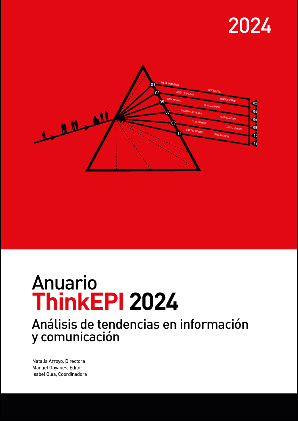Journalists’ Training in the age of Artificial Intelligence: Approaches from the epistemology of communication
DOI:
https://doi.org/10.3145/thinkepi.2024.e18a11Keywords:
Artificial intelligence, Teaching-learning, Journalism, Competences, Epistemology, UniversityAbstract
The automatization of newsrooms and the use of generative artificial intelligence in media companies have contributed to the theoretical, ethical and practical debates in the field of journalism. Given the evidence that artificial intelligence brings with it opportunities, but also challenges for the practice of social communication and its teaching-learning, questions arise about its impact at the epistemological level and on skills that are not only nuclear, but also of a socio-technological and transversal nature linked to informative activity. In this context, this article reflects on the main conditioning factors of the incorporation of artificial intelligence in current communication curricula, based on a vindication of the value of this technology to develop journalism as a profession at the service of society, beyond its intrinsic usefulness in optimising the processes of news production.Downloads
References
Casero-Ripollés, Andreu; Ortells-Badenes, Sara; Doménech-Fabregat, Hugo (2013). “Las competencias profesionales en periodismo: una evaluación comparativa”. Historia y comunicación social, v. 18, pp. 53-64. https://doi.org/10.5209/rev_HICS.2013.v18.44311
Deuze, Mark (2005). “What is Journalism? Professional identity and ideology of journalists reconsidered”. Journalism, v. 6, n. 4, pp. 442–464. https://doi.org/10.1177/1464884905056815
Freixa, Pere; Redondo-Arolas, Mar (2023). “IA y fotoperiodismo: un escenario por definir”. En: Actas del XV Congreso Internacional de Comunicación Digital y Ciberperiodismo. Desinformación en la era de la inteligencia artificial, 27 y 28 de noviembre de 2023, Bilbao. UPV/EHU.
García-Galera, María-del-Carmen; Martínez-Nicolás, Manuel; Del-Hoyo-Hurtado, Mercedes (2021). “Innovation in journalism educational programmes at university. A systematic review of educational experiences”. Profesional de la información, v. 30, n. 3. https://doi.org/10.3145/epi.2021.may.07
Gómez-Diago, Gloria (2022). “Perspectivas para abordar la inteligencia artificial en la enseñanza de periodismo. Una revisión de experiencias investigadoras y docentes”. Revista latina de comunicación social, n. 80, pp. 29-46. https://www.doi.org/10.4185/RLCS-2022-1542
López-García, Xosé (2021). “Redefinición de metacompetencias, competencias y habilidades de los periodistas digitales”. Anuario ThinkEPI, v. 16, e16a03. https://doi.org/10.3145/thinkepi.2022.e16a03
Lopezosa, Carlos; Codina, Lluís; Pont-Sorribes, Carles; Vállez, Mari (2023). “Uso de la inteligencia artificial generativa en la formación de los periodistas: desafíos, usos y propuesta formativa”. Profesional de la información, v. 32, n. 4, e320408. https://doi.org/10.3145/epi.2023.jul.08
Martínez-Nicolás, Manuel (2023). “Quo vadis, Periodismo? Inserción laboral, mercado de trabajo y formación de los graduados en Periodismo”. Anuario ThinkEPI, v. 17. https://doi.org/10.3145/thinkepi.2023.e17a48
Masip, Pere; López-García, Xosé; Díaz-Noci, Javier; Palomo, Bella; Salaverría, Ramón; Meso-Ayerdi, Koldo (2022). “Pasado, presente y futuro de la enseñanza universitaria del ciberperiodismo: métodos y tendencias”. Profesional de la información, v. 31, n. 1, e310101. https://doi.org/10.3145/epi.2022.ene.01
Peña-Fernández, Simón; Meso-Ayerdi, Koldo; Larrondo-Ureta, Ainara; Díaz-Noci, Javier (2023). “Sin periodistas, no hay periodismo: la dimensión social de la inteligencia artificial generativa en los medios de comunicación”. Profesional de la información, v. 32, n. 2, e320227. https://doi.org/10.3145/epi.2023.mar.27
Piscitelli, Andrea (2022). “Escritura centauro en la era de la creatividad computacional”. Revista Telos, Nº 12. https://telos.fundaciontelefonica.com/revista/telos-120
Tejedor, Santiago; Pulido, Cristina (eds.) (2021). Rethinking digital native communicators training. Pamplona: Thompson Reuters Aranzadi.
Túñez-López, José-Miguel; Toural-Bran, Carlos; Frazão-Nogueira, Ana-Gabriela (2020). “From data journalism to robotic journalism: The automation of news processing. In: Vázquez-Herrero, José; Direito-Rebollal, Sabela; Silva-Rodríguez, Alba; López-García, Xosé (Eds.) Journalistic metamorphosis. Studies in big data, Vol. 70. Cham: Springer. https://doi.org/10.1007/978-3-030-36315-4_2
Umaschi-Bers, Marina (2022). Beyond coding: How children learn human values through programming. Cambridge, MA: MIT Press.
Downloads
Published
How to Cite
Dimensions


